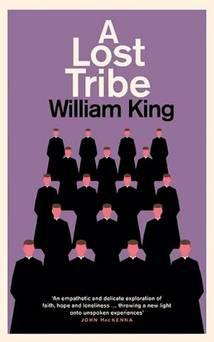|
Priest puts in words the loneliness and isolation of Church's lost tribe
By Sean Hayes
Fiction: A Lost Tribe, William King, Lilliput Press, €15.00 Struggling with the near impossible expectations of the priesthood is a familiar subject in the work of William King, parish priest at Rathmines. His previous novels, which include The Strangled Impulse (1997, 2014) and Leaving Ardglass (2008), address such issues, while also punctuating a wider national tale that has seen Ireland shaken by scandal, and the near collapse of the Catholic Church. Thomas Galvin finds himself at the steps of Coghill House, St Paul's seminary, where he trained almost five decades previously, for a retreat with his ageing counterparts in the clergy. Through alternating chapters, he relives the memories of his youth, and recounts how he and his peers were seduced by the promise of power, and the supposedly modern outlook now favoured by the Vatican Council. What is most striking, perhaps, is how far the church has fallen in the eyes of Irish society today. The seminary that once turned away hopeful entrants now has just one student up for ordination this year. Indeed, Galvin remembers how, outside the Pro-Cathedral, mothers "waited to have their babies blessed; others… hurrying so that their babies would also slip within the aura of the blessing". The reality now for Galvin, and his colleagues, is a life of isolation, loneliness and, in some cases, harassment. Many suffer from depression and alcoholism; one priest candidly admits that he turns the radio on so as to feel as if someone else is in the house. Lively, engaging characters populate this novel - Mac, a spirited young seminarian later expelled for a late-night romp with the enchanting 'Lovely Legs', and Damien Irwin, astutely ambitious and hell-bent on reaching Rome - yet they are relegated to the peripheries of the narrative, their dynamism thwarted by the oppressive forces of the Church. Galvin himself is helpless in the face of the whimsical demands and fancies of the church's upper echelons, and is often moved from parish and post with little forewarning or consideration for his well-being. This frustrating passivity and refusal to take a stand means that, through sheer lack of action, Galvin becomes an unwitting accomplice and wrongly accused of both financial corruption and, later, covering up abuse within the establishment. From the outset, King places himself in a vulnerable position: one which readers may be quick to lambaste and ridicule. Even one fellow priest quips: "No wonder Ireland gave the Church an almighty kick up the a***." While not wholly defending the role of the priest in contemporary Irish life, King at least attempts to shine a light on those caught in the crossfire, inadvertently tarnished by the appalling revelations of sexual abuse within the Catholic Church. The novel's epitaph, a line from Dylan Thomas's radio drama, Under Milk Wood, asks of the reader: "And thou, I know, wilt be the first/ To see our best side, not our worst." King skilfully succeeds in presenting a more personal, human face to a previously untouchable, deific figure; whether or not, however, the reading public is ready to welcome back this lost tribe with open arms remains to be seen.
|
.
Any original material on these pages is copyright © BishopAccountability.org 2004. Reproduce freely with attribution.
